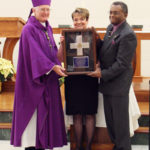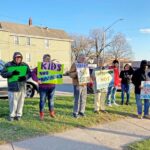Following up on his encyclical emphasizing care for all of creation, Pope Francis met last week with city mayors from around the world because he believes concrete action starts at the grassroots level. We applaud his approach, but would have recommended a mayor from a medium-sized city like Davenport, Des Moines or Cedar Rapids to participate in the brainstorming. What better state than Iowa, which is keenly aware of the interplay between environment and human activity? Iowa, which sets the pace with clean energy in wind turbine production and, conversely, sends pollutants streaming into the Gulf of Mexico that create a “dead zone.”
The pope’s encyclical, Laudato Si, teaches about the relationships of people with one another, with the environment and with God. In his meetings with mayors, local administrators and some U.N. representatives, Pope Francis said care for the environment means adopting an attitude of human ecology. He told them that humanity cannot be separated from the environment. Humans have abused the environment through selfishness. Furthermore, the people who suffer are the least equipped to deal with it.
Pope Francis gave examples:
• Unfettered growth in cities and, along with it, growing bands of poverty and misery. The poor suffer the effects of environmental neglect, the loss of opportunities in rural areas. We see this in Iowa, where poverty in rural communities is exacerbated by a lack of access to health care and human services.
• Technocracy (a social or political system giving greater power to scientific or technical experts), leading to the loss of work and to unemployment. The pope sees a need for moderation in the creation of and use of technology. Some Iowans are among those left behind in the job market because they lack technological skills. Funding education for lifelong learning is essential.
• Health challenges. The pope spoke of rare diseases which he said often come from the use of certain fertilizers and “excessive technification.” More testing and evaluation of the impact of chemicals on human beings ought to be conducted. Boosting yields on the farm or financing urban sprawl should not come at the expense of people and creatures of the earth.
• Desertification, deforestation and other environmental issues. In Iowa, for example, the loss of bees and other insect pollinators is a growing concern. We depend on them for the food we eat. We are compelled to develop habitat hospitable to our natural pollinators.
The pope believes that environmental challenges also contribute to human trafficking and exploitation of people. When people don’t have enough to eat or the means to support their families, they turn to desperate measures. Pope Francis shared how a delegation of women from the United Nations told him of their concerns about sexual exploitation of children in countries at war. He observed that wars “are another element contributing to environmental imbalance” (VIS, July 22, 2015). We have an obligation to foster peace in our own backyards and to advocate for sustainable living from the grassroots to throughout the globe.
Pope Francis hopes the Paris Summit scheduled for this December will lead to a basic agreement on tackling climate change among the 196 countries expected to meet there. But he also recognizes that effecting change begins at the grassroots level where mayors deal with flooded or caved-in streets, unemployment’s impact on funding for city services, the homeless, aging storm and sanitary sewer systems, landfill and recycling issues, among others.
Even though Iowa’s mayors weren’t consulted directly, we as individuals can encourage them to take action on issues that impact the well-being of our communities. We can do this by staying informed about proposed legislation that impacts our land, waterways, plants, animals, the poor and other vulnerable people. We can attend city council meetings and voice our concerns. This is one way to take our faith to the marketplace and acknowledge our interconnectedness with God, each other and the earth.
Barb Arland-Fye











